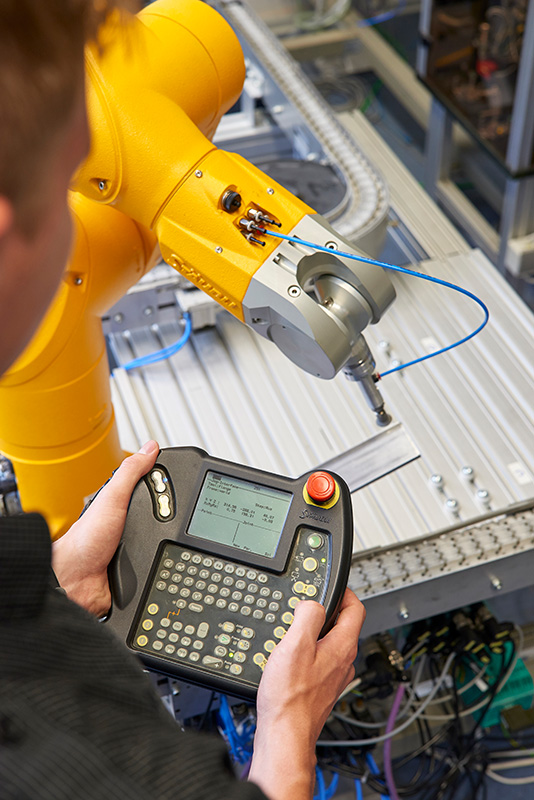
Automation Technology and Robotics
In A Nutshell
Profile
The automation of production processes is an important competitive factor for all branches of industry in Germany. Electrical engineers with well-founded knowledge in automation technology and robotics make a significant contribution to the continuous improvement of production quality and efficiency. They are therefore in more demand than ever.
Practical orientation
The program is designed specifically for the requirements of professional practice. The students work in teams with students from other academic programs, thereby training their social skills. Specific projects with industrial partners challenge the students to present their work results confidently and establish contacts in the practical world.
Practical Training
Basic internship
A basic internship is not required. However, before the start of the program, we recommend having practical experience in corresponding companies, so you can form an idea of the professional work environment ahead of time.
Required internship
The required internship usually takes place in the fourth semester of the program. It is directed systematically and spans a contiguous period of 18 weeks. In addition, there are a few educational events to go along with the practical training. The required internship can also be spent abroad. The university has good contacts with businesses and will help students find a suitable internship position.
Structure of the program

Semester 1 - 3:
General principles:
- Mathematics
- Physics
- Computer science & programming
- English
- Business administration
Principles of electrical engineering:
- Principles of electrical engineering 1 and 2
- Electronic components and circuit technology
- Electric measurements
- Digital technology
- Microcomputer technology
- Electric drives and grids
- Signals and systems
- Fundamentals of control and feedback control technology
Semester 4: Required internship
Semester 5 - 7:
Compulsory subjects:
- Control and converter technology
- Kinematics and control of robots
- Image processing
- Motion control
- Hardware and software design in automation technology.
Application-oriented specialization subjects with options:
- Simulation technologies with MathLab/Simulink
- Layout of mechatronic systems
- Control technology and industrial bus systems
- Technology of CNC-controlled machine tools
- Robot programming
- Practical control technology
You can also take specialization subjects in other departments, such as sensor and actuator technologies or production technology.
Semester 7:
Bachelor thesis with accompanying seminar and methods of project management.
Curriculum and Examination Regulations
The [study plan]* provides an overview of the structure of the program. The [module manual] provides information about the content of the individual modules. The [study and examination regulations]* form the legal basis for the study program. Contact your academic advisor Prof. Dr. Jochen Jirmann concerning the content of the program.
*only available in german at the moment
Job Perspective
As an export nation for plant and mechanical engineering and automobile production, Germany has a great need for specialists in the areas of robotics and automation. A large number of employees is found in the area of electric automation technology, i.e. in the area of production of control and circuit devices or in image processing.
Automation specialists are just as important in the manufacture of production systems, in automobile production, and for specialists in mechanical engineering, such as machine tool producers. The age pyramid in our population will lead to a significantly more engineers leaving professional life in the coming years than are currently being trained. This new academic program wants to help close this gap, and at the same time, train specialists for a very large segment of the labor market.
Master's degree
After completing the Bachelor’s degree, good graduates have the possibility of obtaining further qualifications with a Master's degree. For this purpose, the Coburg University offers the following Master’s degrees:
- Electrical Engineering and Information Technology
- Computer Science
- Development and Management in Mechanical Engineering
- Simulation and testing
These programs continue directly after the Bachelor’s degree.
Application and Admission Requirements
Here you can find all the important information about evaluating your school-leaving certificates and learning German in order to start a bachelor program at the University of Coburg.
Since the program is taught in German, you also have to prove your knowledge in German before the start of studies (level C1/C2).
